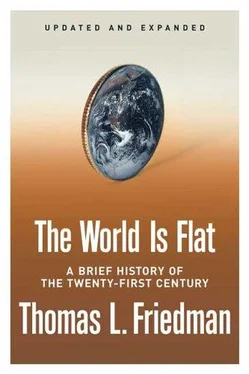And we have not seen anything yet. China, with its own oil and gas reserves, was once a net exporter. Not anymore. In 2003 China surged ahead of Japan as the second largest importer of oil in the world, after the United States. Right now about 700 to 800 million of China's 1.3 billion people live in the countryside, but they are heading for the flat world, and roughly half are expected to try to migrate to the cities over the next two decades, if they can find work. This will spur a huge surge in demand for cars, houses, steel beams, power plants, school buildings, sewage plants, electricity grids-the energy implications of which are unprecedented in the history of Planet Earth, round or flat.
At the business conference I was attending in Beijing, I kept hearing references to the Strait of Malacca-the narrow passage between Malaysia and Indonesia that is patrolled by the U.S. Navy and controls all the oil tanker traffic from the Middle East to China and Japan. I hadn't heard anyone talking about the Strait of Malacca since the 1970s oil crises. But evidently Chinese strategic planners have begun to grow increasingly concerned that the United States could choke off China's economy at any time by just closing the Strait of Malacca, and this threat is now being increasingly and openly discussed in Chinese military circles. It is just a small hint of the potential struggle for power-energy power-that could ensue if the Great American Dream and the Great Chinese Dream and the Great Indian Dream and the Great Russian Dream come to be seen as mutually exclusive in energy terms.
China's foreign policy today consists of two things: preventing Taiwan from becoming independent and searching for oil. China is now obsessed with acquiring secure oil supplies from countries that would not retaliate against China if it invaded Taiwan, and this is driving China to get cozy with some of the worst regimes in the world. The Islamic fundamentalist government in Sudan now supplies China with 7 percent of its oil supplies and China has invested $3 billion in oil drilling infrastructure there.
In September 2004, China threatened to veto a move by the United Nations to impose sanctions on Sudan for the genocide that it is perpetrating in its Darfur province. China followed by opposing any move to refer Iran's obvious attempts to develop nuclear-weapons-grade fuel to the United Nations Security Council. Iran supplies 13 percent of China's oil supplies. Meanwhile, as the Daily Telegraph reported (November 19, 2004), China has begun drilling for gas in the East China Sea, just west of the line that Japan regards as its border: “Japan protested, to no avail, that the project should be a joint one. The two are also set to clash over Russia's oil wealth. China is furious that Japan has outbid it in their battle to determine the route of the pipeline that Russia intends to build to the Far East.” At the same time it was reported that a Chinese nuclear submarine had accidentally strayed into Japanese territorial waters. The Chinese government apologized for the “technical error.” If you believe that, I have an oil well in Hawaii I would like to sell you...
In 2004, China began competing with the United States for oil exploration opportunities in Canada and Venezuela. If China has its way, it will stick a straw into Canada and Venezuela and suck out every drop of oil, which will have the side effect of making America more dependent on Saudi Arabia.
I interviewed the Japanese manager of a major U.S. multinational that was headquartered in Dalian, in northeastern China. “China is following the path of Japan and Korea,” said the executive, on the condition that he and his company not be quoted by name, “and the big question is, Can the world afford to have 1.3 billion people following that path and driving the same cars and using the same amount of energy? So I see the flattening, but the challenge of the twenty-first century is, Are we going to hit another oil crisis? The oil crisis in the 1970s coincided with Japan and Europe rising. [There was a time] when the U.S. was the only big consumer of oil, but when Japan and Europe came in, OPEC got the power. But when China and India come into being the consumers, it will be a huge challenge that is an order of magnitude different. It is megapolitics. The limits of growth in the 1970s were overcome with technology. We got smarter than before, equipment became more efficient, and energy consumption per head was lower. But now [with China, India, and Russia all coming on strong] it is multiplied by a factor of ten. There is something we really need to be serious about. We cannot restrict China, [Russia,] and India. They will grow and they must grow.”
One thing we will not be able to do is tell young Indians, Russians, Poles, or Chinese that just when they are arriving on the leveled playing field, they have to hold back and consume less for the greater global good. While giving a talk to students at the Beijing College of Foreign Affairs, I spoke about the most important issues that could threaten global stability, including the competition for oil and other energy resources that would naturally occur as China, India, and the former Soviet Union began to consume more oil. No sooner did I finish than a young Chinese woman student shot up her hand and asked basically the following question: “Why should China have to restrain its energy consumption and worry about the environment, when America and Europe got to consume all they energy they wanted when they were developing?” I did not have a good answer. China is a high-pride country. Telling China, India, and Russia to consume less could have the same geopolitical impact that the world's inability to accommodate a rising Japan and Germany had after World War I.
If current trends hold, China will go from importing 7 million barrels of oil today to 14 million a day by 2012. For the world to accommodate that increase it would have to find another Saudi Arabia. That is not likely, which doesn't leave many good options. “For geopolitical reasons, we cannot tell them no, we cannot tell China and India, it is not your turn,” said Philip K. Verleger Jr., a leading oil economist. “And for moral reasons, we have lost the ability to lecture anyone.” But if we do nothing, several things will likely result. First, gasoline prices will continue to trend higher and higher. Second, we will be strengthening the very worst political systems in the world-like Sudan, Iran, and Saudi Arabia. And third, the environment will be damaged more and more. Already, the newspaper headlines in China every day are about energy shortages, blackouts, and brownouts. U.S. officials estimate that twenty-four out of China's thirty-one provinces are now experiencing power shortages.
We are all stewards of the planet, and the test for our generation is whether we will pass on a planet in as good or better shape than we found it. The flattening process is going to challenge that responsibility. “Aldo Leopold, the father of wildlife ecology, once said: 'The first rule of intelligent tinkering is save all the pieces,'” remarked Glenn Prickett, senior vice president of Conservation International. “What if we don't? What if the 3 billion new entrants start gobbling up all the resources? Species and ecosystems can't adapt that fast, and we will lose a major portion of the earth's remaining biological diversity.” Already, noted Prickett, if you look at what is happening in the Congo Basin, the Amazon, the rain forest of Indonesia-the last great wilderness areas-you find that they are being devoured by China's rising appetite. More and more palm oil is being extracted from Indonesia and Malaysia, soybeans out of Brazil, timber out of central Africa, and natural gas out of all of the above to serve China-and, as a result, threatening all sorts of natural habitats. If these trends go on unchecked, with all the natural habitats being converted to farmland and urban areas, and the globe getting warmer, many of the currently threatened species will be condemned to extinction.
Читать дальше












